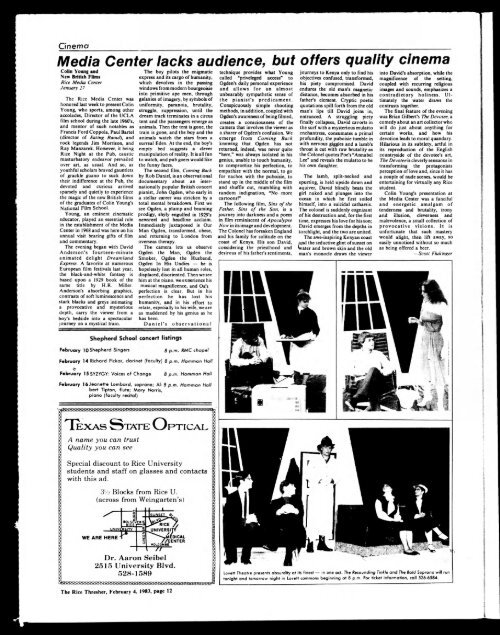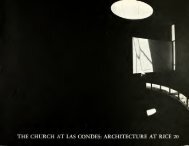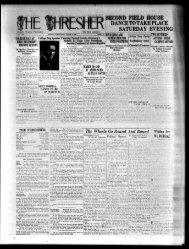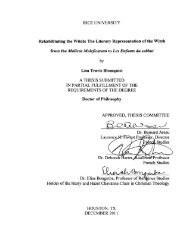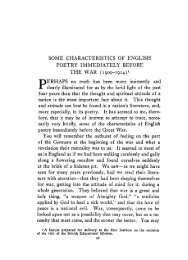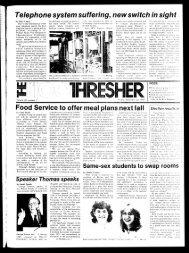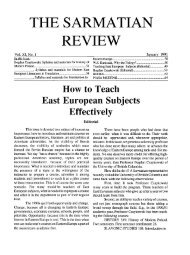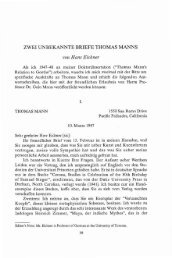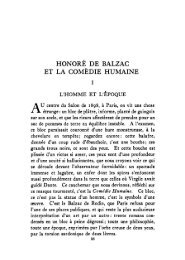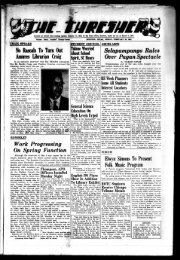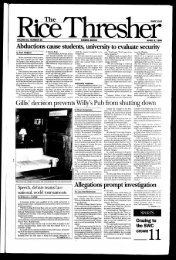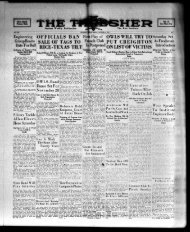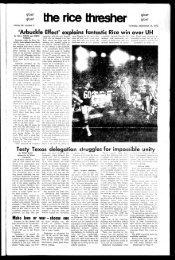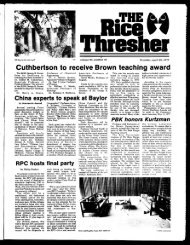A" -rf Hackerman shrugs off low ratings of grad programs - Rice ...
A" -rf Hackerman shrugs off low ratings of grad programs - Rice ...
A" -rf Hackerman shrugs off low ratings of grad programs - Rice ...
You also want an ePaper? Increase the reach of your titles
YUMPU automatically turns print PDFs into web optimized ePapers that Google loves.
Cinema<br />
Media Center lacks audience, but <strong><strong>of</strong>f</strong>ers quality cinema<br />
Colin Young and<br />
New British Films<br />
<strong>Rice</strong> Media Center<br />
January 27<br />
The <strong>Rice</strong> Media Center was<br />
honored last week to present Colin<br />
Young, who sports, among other<br />
accolades, Director <strong>of</strong> the UCLA<br />
film school during the late 1960's,<br />
and mentor <strong>of</strong> such notables as<br />
Francis Ford Coppola, Paul Bartel<br />
(director <strong>of</strong> Eating Raoul), and<br />
rock legends Jim Morrison, and<br />
Ray Manzarek. However, it being<br />
<strong>Rice</strong> Night at the Pub, caustic<br />
masturbatory endeavor prevailed<br />
over art, as usual. And so, as<br />
youthful scholars braved gauntlets<br />
<strong>of</strong> grackle guano to suck down<br />
their indifference at the Pub, the<br />
devoted and curious arrived<br />
sparsely and quietly to experience<br />
the magic <strong>of</strong> the new British films<br />
<strong>of</strong> the <strong>grad</strong>uates <strong>of</strong> Colin Young's<br />
National Film School.<br />
Young, an eminent cinematic<br />
educator, played an essential role<br />
in the establishment <strong>of</strong> the Media<br />
Center in 1968 and was here on his<br />
annual visit bearing gifts <strong>of</strong> film<br />
and commentary.<br />
The evening began with David<br />
Anderson's fourteen-minute<br />
animated delight Dreamland<br />
Express. A favorite at numerous<br />
European film festivals last year,<br />
the black-and-white fantasy is<br />
based upon a 1929 book <strong>of</strong> the<br />
same title by H.R. Miller.<br />
Anderson's absorbing graphics,<br />
contrasts <strong>of</strong> s<strong>of</strong>t luminescence and<br />
stark blacks and greys intimating<br />
a provocative and mysterious<br />
depth, carry the viewer from a<br />
boy's bedside into a spectacular<br />
journey on a mystical train.<br />
The boy pilots the enigmatic<br />
express and its cargo <strong>of</strong> humanity,<br />
which devolves in the passing<br />
windows from modern bourgeoisie<br />
into primitive ape men, through<br />
galaxies <strong>of</strong> imagery, by syfnbols <strong>of</strong><br />
uniformity, paranoia, brutality,<br />
struggle, suppression, until the<br />
dream track terminates in a circus<br />
tent and the passengers emerge as<br />
animals. Then the tent is gone, the<br />
train is gone, and the boy and the<br />
animals watch the stars from a<br />
surreal Eden. At the end, the boy's<br />
empty bed suggests a clever<br />
manipulation <strong>of</strong> reality. It is all fun<br />
to watch, and pub goers would like<br />
the funny faces.<br />
The second film, Coming Back<br />
by Rob Daniel, is an observational<br />
documentary about an internationally<br />
popular British concert<br />
pianist, John Ogden, who early in<br />
a stellar career was stricken by a<br />
total mental breakdown. First we<br />
see Ogden, a plump and beaming<br />
prodigy, shyly engulfed in 1929's<br />
newsreel and headline acclaim.<br />
Immediately juxtaposed is Our<br />
Man Ogden, transformed, obese,<br />
and returning to London from<br />
overseas therapy.<br />
The camera lets us observe<br />
Ogden the Man, Ogden the<br />
Smoker, Ogden the Husband,<br />
Ogden In His Undies — he is<br />
hopelessly lost in all human roles,<br />
displaced, disoriented. Then we see<br />
him at the Diano. we exr>erience his<br />
musical magnificence, and Og's<br />
pe<strong>rf</strong>ection is clear. But in his<br />
De<strong>rf</strong>ection he has lost his<br />
humanity, and in his effort to<br />
relate, especially to his wife, we are<br />
as maddened by his genius as he<br />
has been.<br />
Daniel's observational<br />
Shepherd School concert listings<br />
February 10 Shepherd Singers 8 p.m. RMC chapel<br />
February 14 Richard Pickar, clarinet (faculty) 8 p.m. Hamman Hall<br />
•Jr<br />
February 15SYZYGY: Voices <strong>of</strong> Change 8 p.m. Hamman Hall<br />
February 16Jeanette Lombard, soprano; Al- 8 p.m. Hamman Hall<br />
bert Tipton, flute; Mary Norris,<br />
piano (faculty recital)<br />
A name you can trust<br />
Quality you can see<br />
Special discount to <strong>Rice</strong> University<br />
students and staff on glasses and contacts<br />
with this ad.<br />
3V> Blocks from <strong>Rice</strong> U.<br />
(across from Weingarten's)<br />
SUNSET jg<br />
BOLSTER®<br />
mcEf—g<br />
"~|TY<br />
11<br />
U&1VER UNIVERSI<br />
WE ARE HERE<br />
„ DICAl<br />
/CENTER<br />
HOLCOMBE<br />
77"<br />
Dr. Aaron Seibel<br />
2515 University Blvd.<br />
528-1589<br />
The <strong>Rice</strong> Thresher, February 4, 1983, page 12<br />
technique provides what Young<br />
called "priveleged access" to<br />
Ogden's daily personal experience<br />
and al<strong>low</strong>s for an almost<br />
unbearably sympathetic sense <strong>of</strong><br />
the pianist's predicament.<br />
Conspicuously simple shooting<br />
methods, in addition, coupled with<br />
Ogden's awareness <strong>of</strong> being filmed,<br />
creates a consciousness <strong>of</strong> the<br />
camera that involves the viewer as<br />
a sharer <strong>of</strong> Ogden's confusion. We<br />
emerge from Coming Back<br />
knowing that Ogden has not<br />
returned, indeed, was never quite<br />
"here," was always isolated in his<br />
genius, unable to touch humanity,<br />
to compromise his pe<strong>rf</strong>ection, to<br />
empathize with the normal, to go<br />
for nachos with the puboisie, to<br />
stand up in the middle <strong>of</strong> the film<br />
and shuffle out, mumbling with<br />
random indignation, "No more<br />
cartoons?"<br />
The fol<strong>low</strong>ing film, Sins <strong>of</strong> the<br />
Father, Sins <strong>of</strong> the Son, is a<br />
journey into darkness and a poem<br />
in film reminiscent <strong>of</strong> Apocalypse<br />
Now in its image and development.<br />
The Colonel has forsaken England<br />
and his family for solitude on the<br />
coast <strong>of</strong> Kenya. His son David,<br />
considering the priesthood and<br />
desirous <strong>of</strong> his father's sentiments.<br />
journeys to Kenya only to find his<br />
objectives confused, transformed,<br />
his piety compromised. David<br />
endures the old man's magnetic<br />
distance, becomes absorbed in his<br />
father's element. Cryptic poetic<br />
quotations spill forth from the old<br />
man's lips till David joins in,<br />
entranced. A struggling piety<br />
finally collapses, David cavorts in<br />
the su<strong>rf</strong> with a mysterious mulatto<br />
enchantress, consumates a primal<br />
pr<strong>of</strong>undity, the puboisie tumble in<br />
with nervous giggles and a lamb's<br />
throat is cut with raw brutality as<br />
the Colonel quotes Poe's "Annabel<br />
Lee" and reveals the mulatto to be<br />
his own daughter.<br />
The lamb, split-necked and<br />
spurting, is held upside down and<br />
aquiver, David blindly beats the<br />
girl naked and plunges into the<br />
ocean in which he first soiled<br />
himself, into a suicidal catharsis.<br />
The colonel is suddenly cognizant<br />
<strong>of</strong> his destruction and, for the first<br />
time, expresses his love for his son;<br />
David emerges from the depths in<br />
torchlight, and the two are united.<br />
The awe-inspiring Kenyan coast<br />
ajid the seductive glint <strong>of</strong> sunset on<br />
•water and brown skin and the old<br />
man's monocle draws the viewer<br />
into David's absorption, while the<br />
magnificence <strong>of</strong> the setting,<br />
coupled with recurring religious<br />
images and sounds, emphasizes a<br />
contradictory holiness. Ultimately<br />
the water draws the<br />
contrasts together.<br />
The final feature <strong>of</strong> the evening<br />
was Brian Gilbert's The Devotee, a<br />
comedy about an art collector who<br />
will do just about anything for<br />
certain works, and how his<br />
devotion leads to moral quandary.<br />
Hilarious in its subtlety, artful in<br />
its reproduction <strong>of</strong> the English<br />
countryside <strong>of</strong> the devotee's art,<br />
The Devotee is cleverly sensuous in<br />
transforming the protagonists<br />
perception <strong>of</strong> love and, since it has<br />
a couple <strong>of</strong> nude scenes, would be<br />
entertaining for virtually any <strong>Rice</strong><br />
student.<br />
Colin Young's presentation at<br />
the Media Center was a fanciful<br />
and energetic amalgam <strong>of</strong><br />
tenderness and brutality, irony<br />
and illusion, cleverness and<br />
malevolence, a small collection <strong>of</strong><br />
provocative visions. It is<br />
unfortunate that such mastery<br />
would alight, then lift away, so<br />
easily unnoticed without so much<br />
as being <strong><strong>of</strong>f</strong>ered a beer.<br />
—Scott Flukinger<br />
Lovett Theatre presents absurdity at its finest — in one act. The Resounding Tinkle and The Bald Soprano wi II run<br />
tonight and tomorrow night in Lovett commons beginning at 8 p.m. For ticket information, call 526-6584.


